Mental Health Wellbeing: Case Study, Legal, Ethical Considerations
VerifiedAdded on 2022/10/01
|5
|1094
|284
Essay
AI Summary
This essay analyzes a case study focusing on a client experiencing low mood and potential self-harm thoughts. It identifies urgent risk areas, such as the client's lack of interest in living and social exclusion, and proposes nursing interventions like psychotherapy and health education to address these concerns. The essay emphasizes building a therapeutic relationship through effective communication and promoting self-resilience. Furthermore, it discusses legal, ethical, and professional issues, such as informed consent and respecting the client's autonomy, that nurses must consider when working with individuals experiencing mental health challenges. The analysis is supported by current literature, highlighting the importance of addressing mental health concerns to improve overall wellbeing. Desklib offers similar solved assignments and past papers for students.
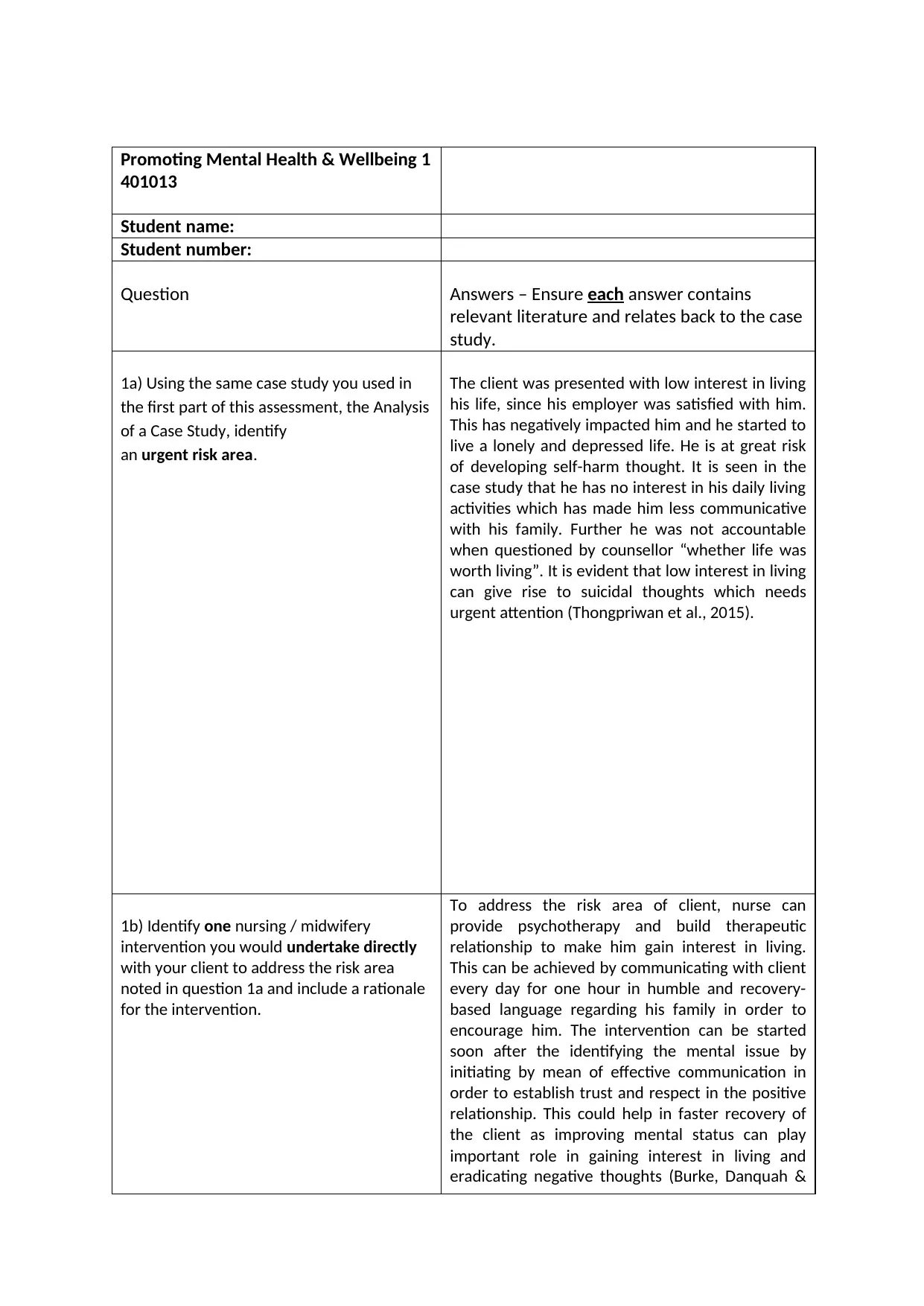
Promoting Mental Health & Wellbeing 1
401013
Student name:
Student number:
Question Answers – Ensure each answer contains
relevant literature and relates back to the case
study.
1a) Using the same case study you used in
the first part of this assessment, the Analysis
of a Case Study, identify
an urgent risk area.
The client was presented with low interest in living
his life, since his employer was satisfied with him.
This has negatively impacted him and he started to
live a lonely and depressed life. He is at great risk
of developing self-harm thought. It is seen in the
case study that he has no interest in his daily living
activities which has made him less communicative
with his family. Further he was not accountable
when questioned by counsellor “whether life was
worth living”. It is evident that low interest in living
can give rise to suicidal thoughts which needs
urgent attention (Thongpriwan et al., 2015).
1b) Identify one nursing / midwifery
intervention you would undertake directly
with your client to address the risk area
noted in question 1a and include a rationale
for the intervention.
To address the risk area of client, nurse can
provide psychotherapy and build therapeutic
relationship to make him gain interest in living.
This can be achieved by communicating with client
every day for one hour in humble and recovery-
based language regarding his family in order to
encourage him. The intervention can be started
soon after the identifying the mental issue by
initiating by mean of effective communication in
order to establish trust and respect in the positive
relationship. This could help in faster recovery of
the client as improving mental status can play
important role in gaining interest in living and
eradicating negative thoughts (Burke, Danquah &
401013
Student name:
Student number:
Question Answers – Ensure each answer contains
relevant literature and relates back to the case
study.
1a) Using the same case study you used in
the first part of this assessment, the Analysis
of a Case Study, identify
an urgent risk area.
The client was presented with low interest in living
his life, since his employer was satisfied with him.
This has negatively impacted him and he started to
live a lonely and depressed life. He is at great risk
of developing self-harm thought. It is seen in the
case study that he has no interest in his daily living
activities which has made him less communicative
with his family. Further he was not accountable
when questioned by counsellor “whether life was
worth living”. It is evident that low interest in living
can give rise to suicidal thoughts which needs
urgent attention (Thongpriwan et al., 2015).
1b) Identify one nursing / midwifery
intervention you would undertake directly
with your client to address the risk area
noted in question 1a and include a rationale
for the intervention.
To address the risk area of client, nurse can
provide psychotherapy and build therapeutic
relationship to make him gain interest in living.
This can be achieved by communicating with client
every day for one hour in humble and recovery-
based language regarding his family in order to
encourage him. The intervention can be started
soon after the identifying the mental issue by
initiating by mean of effective communication in
order to establish trust and respect in the positive
relationship. This could help in faster recovery of
the client as improving mental status can play
important role in gaining interest in living and
eradicating negative thoughts (Burke, Danquah &
Paraphrase This Document
Need a fresh take? Get an instant paraphrase of this document with our AI Paraphraser
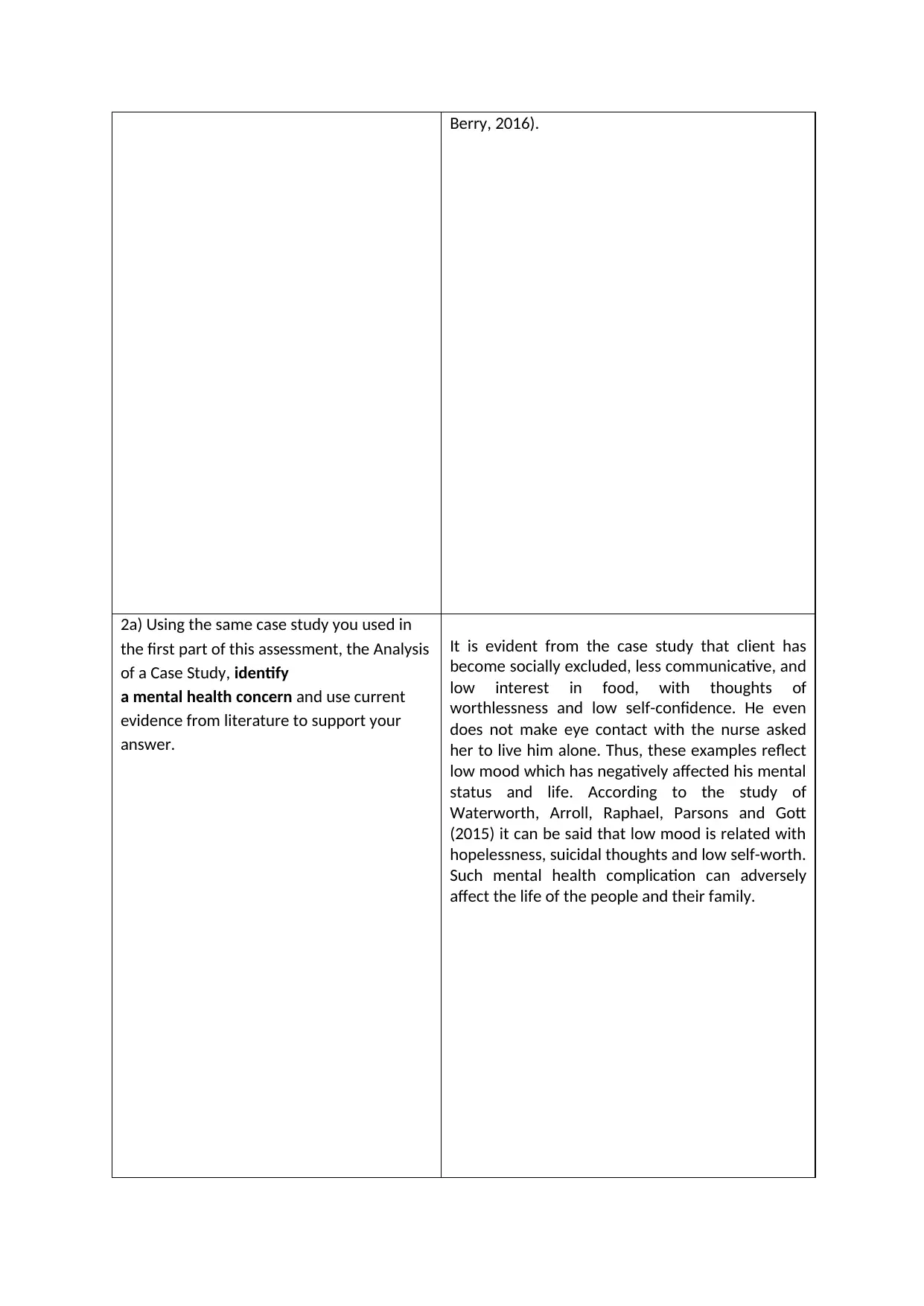
Berry, 2016).
2a) Using the same case study you used in
the first part of this assessment, the Analysis
of a Case Study, identify
a mental health concern and use current
evidence from literature to support your
answer.
It is evident from the case study that client has
become socially excluded, less communicative, and
low interest in food, with thoughts of
worthlessness and low self-confidence. He even
does not make eye contact with the nurse asked
her to live him alone. Thus, these examples reflect
low mood which has negatively affected his mental
status and life. According to the study of
Waterworth, Arroll, Raphael, Parsons and Gott
(2015) it can be said that low mood is related with
hopelessness, suicidal thoughts and low self-worth.
Such mental health complication can adversely
affect the life of the people and their family.
2a) Using the same case study you used in
the first part of this assessment, the Analysis
of a Case Study, identify
a mental health concern and use current
evidence from literature to support your
answer.
It is evident from the case study that client has
become socially excluded, less communicative, and
low interest in food, with thoughts of
worthlessness and low self-confidence. He even
does not make eye contact with the nurse asked
her to live him alone. Thus, these examples reflect
low mood which has negatively affected his mental
status and life. According to the study of
Waterworth, Arroll, Raphael, Parsons and Gott
(2015) it can be said that low mood is related with
hopelessness, suicidal thoughts and low self-worth.
Such mental health complication can adversely
affect the life of the people and their family.
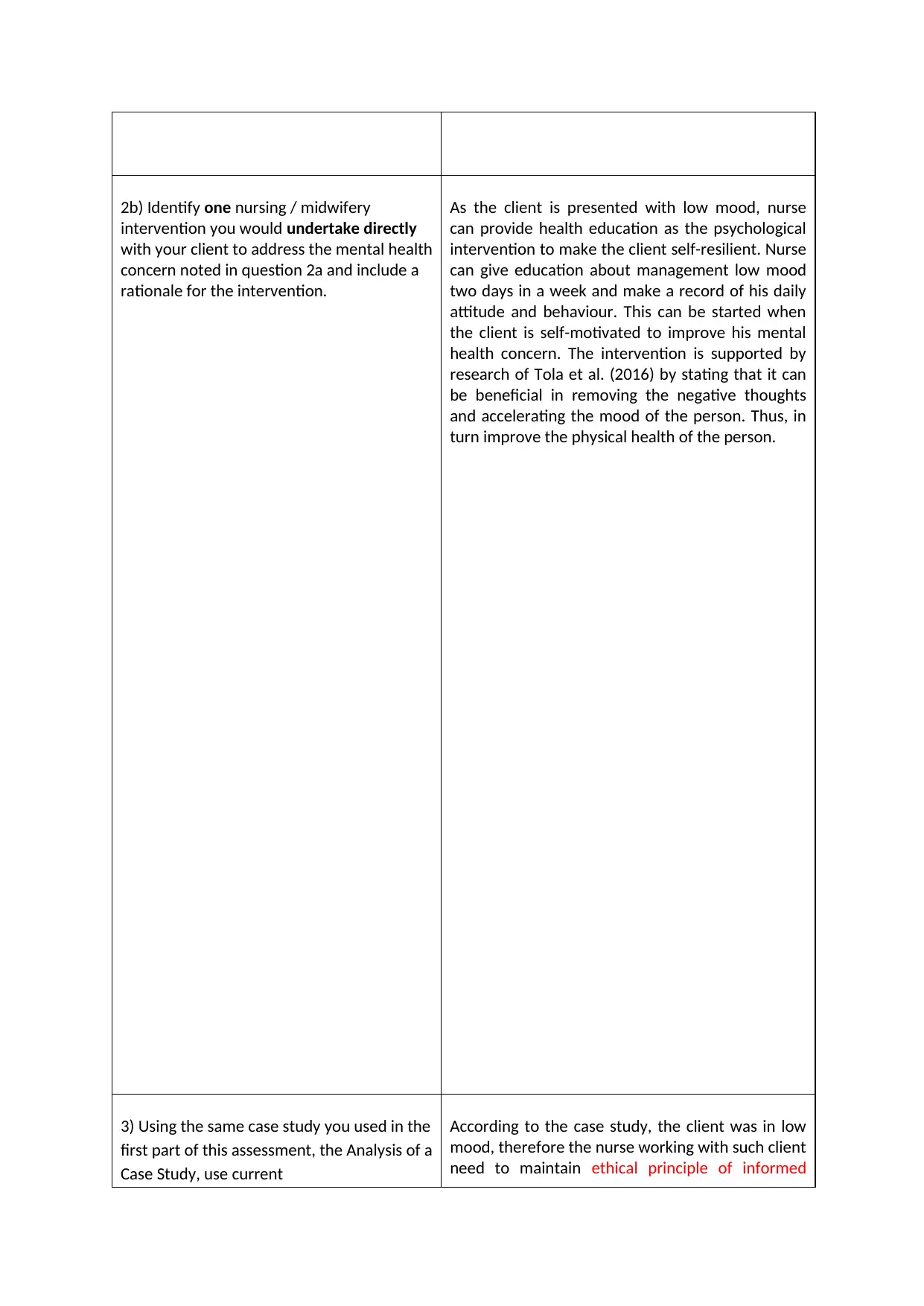
2b) Identify one nursing / midwifery
intervention you would undertake directly
with your client to address the mental health
concern noted in question 2a and include a
rationale for the intervention.
As the client is presented with low mood, nurse
can provide health education as the psychological
intervention to make the client self-resilient. Nurse
can give education about management low mood
two days in a week and make a record of his daily
attitude and behaviour. This can be started when
the client is self-motivated to improve his mental
health concern. The intervention is supported by
research of Tola et al. (2016) by stating that it can
be beneficial in removing the negative thoughts
and accelerating the mood of the person. Thus, in
turn improve the physical health of the person.
3) Using the same case study you used in the
first part of this assessment, the Analysis of a
Case Study, use current
According to the case study, the client was in low
mood, therefore the nurse working with such client
need to maintain ethical principle of informed
intervention you would undertake directly
with your client to address the mental health
concern noted in question 2a and include a
rationale for the intervention.
As the client is presented with low mood, nurse
can provide health education as the psychological
intervention to make the client self-resilient. Nurse
can give education about management low mood
two days in a week and make a record of his daily
attitude and behaviour. This can be started when
the client is self-motivated to improve his mental
health concern. The intervention is supported by
research of Tola et al. (2016) by stating that it can
be beneficial in removing the negative thoughts
and accelerating the mood of the person. Thus, in
turn improve the physical health of the person.
3) Using the same case study you used in the
first part of this assessment, the Analysis of a
Case Study, use current
According to the case study, the client was in low
mood, therefore the nurse working with such client
need to maintain ethical principle of informed
⊘ This is a preview!⊘
Do you want full access?
Subscribe today to unlock all pages.

Trusted by 1+ million students worldwide
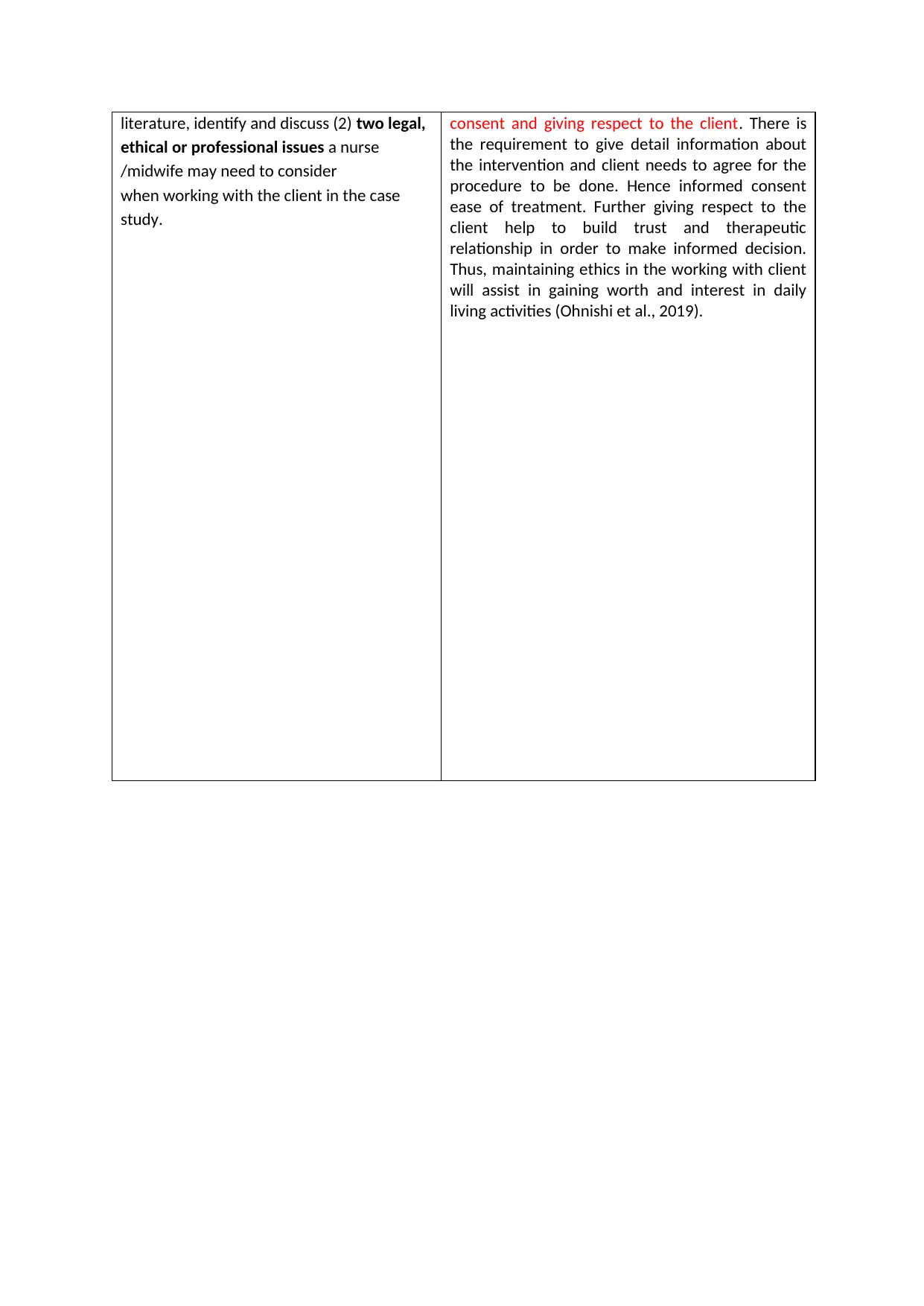
literature, identify and discuss (2) two legal,
ethical or professional issues a nurse
/midwife may need to consider
when working with the client in the case
study.
consent and giving respect to the client. There is
the requirement to give detail information about
the intervention and client needs to agree for the
procedure to be done. Hence informed consent
ease of treatment. Further giving respect to the
client help to build trust and therapeutic
relationship in order to make informed decision.
Thus, maintaining ethics in the working with client
will assist in gaining worth and interest in daily
living activities (Ohnishi et al., 2019).
ethical or professional issues a nurse
/midwife may need to consider
when working with the client in the case
study.
consent and giving respect to the client. There is
the requirement to give detail information about
the intervention and client needs to agree for the
procedure to be done. Hence informed consent
ease of treatment. Further giving respect to the
client help to build trust and therapeutic
relationship in order to make informed decision.
Thus, maintaining ethics in the working with client
will assist in gaining worth and interest in daily
living activities (Ohnishi et al., 2019).
Paraphrase This Document
Need a fresh take? Get an instant paraphrase of this document with our AI Paraphraser
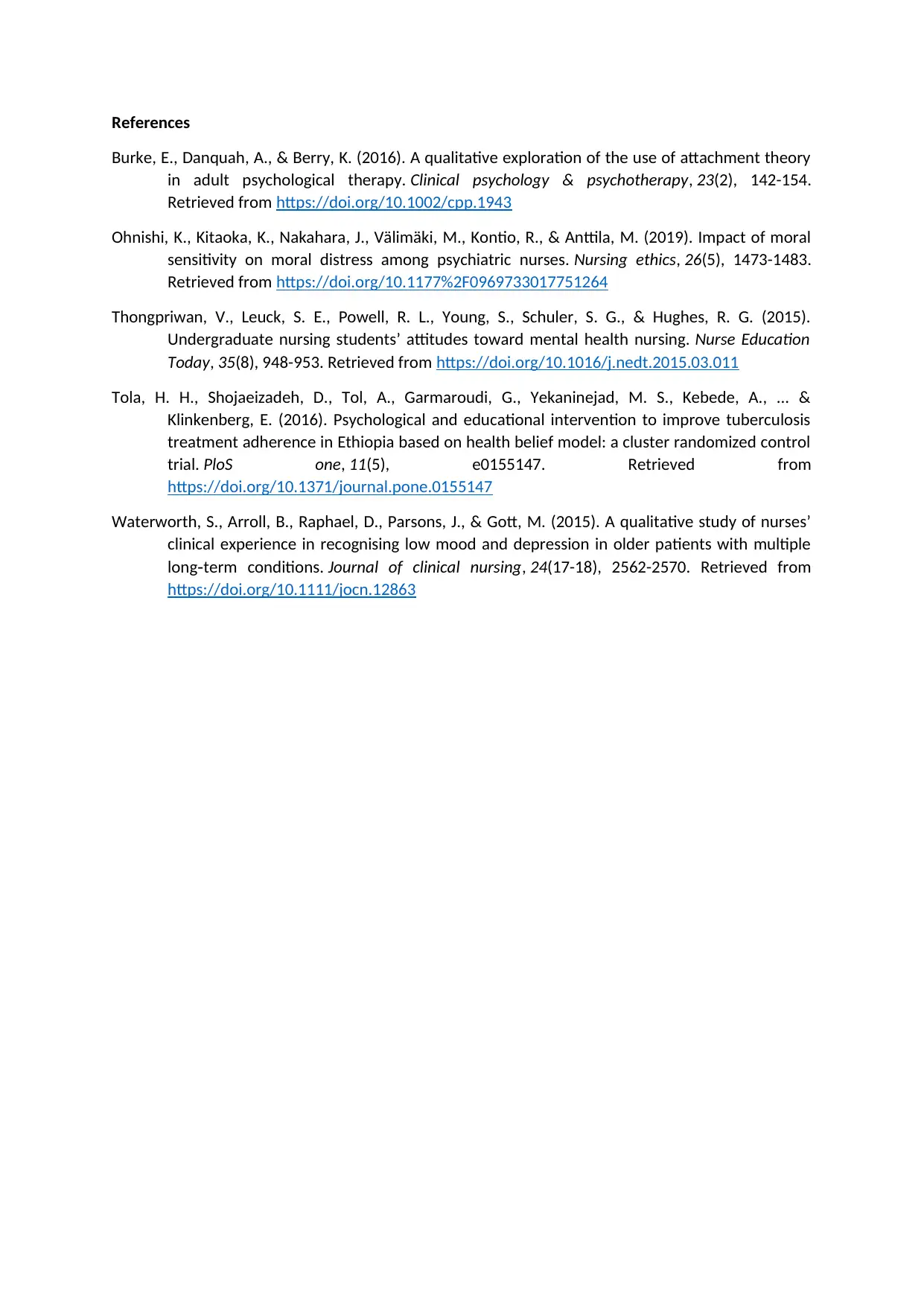
References
Burke, E., Danquah, A., & Berry, K. (2016). A qualitative exploration of the use of attachment theory
in adult psychological therapy. Clinical psychology & psychotherapy, 23(2), 142-154.
Retrieved from https://doi.org/10.1002/cpp.1943
Ohnishi, K., Kitaoka, K., Nakahara, J., Välimäki, M., Kontio, R., & Anttila, M. (2019). Impact of moral
sensitivity on moral distress among psychiatric nurses. Nursing ethics, 26(5), 1473-1483.
Retrieved from https://doi.org/10.1177%2F0969733017751264
Thongpriwan, V., Leuck, S. E., Powell, R. L., Young, S., Schuler, S. G., & Hughes, R. G. (2015).
Undergraduate nursing students’ attitudes toward mental health nursing. Nurse Education
Today, 35(8), 948-953. Retrieved from https://doi.org/10.1016/j.nedt.2015.03.011
Tola, H. H., Shojaeizadeh, D., Tol, A., Garmaroudi, G., Yekaninejad, M. S., Kebede, A., ... &
Klinkenberg, E. (2016). Psychological and educational intervention to improve tuberculosis
treatment adherence in Ethiopia based on health belief model: a cluster randomized control
trial. PloS one, 11(5), e0155147. Retrieved from
https://doi.org/10.1371/journal.pone.0155147
Waterworth, S., Arroll, B., Raphael, D., Parsons, J., & Gott, M. (2015). A qualitative study of nurses’
clinical experience in recognising low mood and depression in older patients with multiple
long term conditions.‐ Journal of clinical nursing, 24(17-18), 2562-2570. Retrieved from
https://doi.org/10.1111/jocn.12863
Burke, E., Danquah, A., & Berry, K. (2016). A qualitative exploration of the use of attachment theory
in adult psychological therapy. Clinical psychology & psychotherapy, 23(2), 142-154.
Retrieved from https://doi.org/10.1002/cpp.1943
Ohnishi, K., Kitaoka, K., Nakahara, J., Välimäki, M., Kontio, R., & Anttila, M. (2019). Impact of moral
sensitivity on moral distress among psychiatric nurses. Nursing ethics, 26(5), 1473-1483.
Retrieved from https://doi.org/10.1177%2F0969733017751264
Thongpriwan, V., Leuck, S. E., Powell, R. L., Young, S., Schuler, S. G., & Hughes, R. G. (2015).
Undergraduate nursing students’ attitudes toward mental health nursing. Nurse Education
Today, 35(8), 948-953. Retrieved from https://doi.org/10.1016/j.nedt.2015.03.011
Tola, H. H., Shojaeizadeh, D., Tol, A., Garmaroudi, G., Yekaninejad, M. S., Kebede, A., ... &
Klinkenberg, E. (2016). Psychological and educational intervention to improve tuberculosis
treatment adherence in Ethiopia based on health belief model: a cluster randomized control
trial. PloS one, 11(5), e0155147. Retrieved from
https://doi.org/10.1371/journal.pone.0155147
Waterworth, S., Arroll, B., Raphael, D., Parsons, J., & Gott, M. (2015). A qualitative study of nurses’
clinical experience in recognising low mood and depression in older patients with multiple
long term conditions.‐ Journal of clinical nursing, 24(17-18), 2562-2570. Retrieved from
https://doi.org/10.1111/jocn.12863
1 out of 5
Related Documents
Your All-in-One AI-Powered Toolkit for Academic Success.
+13062052269
info@desklib.com
Available 24*7 on WhatsApp / Email
![[object Object]](/_next/static/media/star-bottom.7253800d.svg)
Unlock your academic potential
Copyright © 2020–2026 A2Z Services. All Rights Reserved. Developed and managed by ZUCOL.



